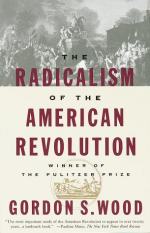|
This section contains 858 words (approx. 3 pages at 400 words per page) |

|
Part 1, Chapter 1 Summary and Analysis
Although the mid-18th century is a time of massive social change, the past remains tenacious. American colonists are Englishmen, sharing the assumption that order and stability in society stem from monarchy. The king is pater familias, and his subjects are dependent beings, lacking autonomy and easily cowed. Still, the Western world views Englishmen as innately insubordinate, insolent, and unwilling to be governed. The colonists share these traits, but are more traditional than those back home. They feel more closely tied to the crown than to fellow colonies, and share the manners, morals and amusements of the mother country on a humbler scale.
Englishmen of every social stratum pride themselves on being freemen with rights and liberties no one else on earth enjoys. Their understanding of monarchy is much different from their European contemporaries and their own ancestors before...
(read more from the Part 1, Chapter 1 Summary)
|
This section contains 858 words (approx. 3 pages at 400 words per page) |

|




